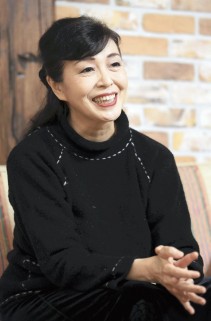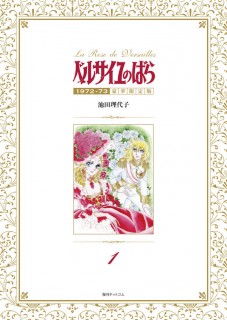Loading
Search
▼ Ikeda’s Manga Made to be Read, Remembered
- Category:Event
This year, veteran mangaka Riyoko Ikeda — who is known for her “Berusaiyu no Bara” (The Rose of Versailles) and “Orufeusu no Mado” (The Window of Orpheus) series — celebrates the 50th anniversary of her debut.
An English-language edition of “Berubara” — short for “Berusaiyu no Bara” — will be published for the first time this summer. What is the driving force behind this 69-year-old artist, also known for her parallel career as a vocalist, and also her continued engagement with various creative works?
“Berubara,” a long-selling series about the upheaval in the run-up to the French Revolution, currently appears in Shueisha Inc.’s Margaret magazine on an irregular basis under the title “Episode.” The latest one is about Marie Antoinette’s involvement with talented watchmaker Breguet.
Ikeda and Breguet share something in common, in that they are both Chevaliers of France’s Legion of Honor. “I didn’t know how great an honor this was until I studied the life of Breguet,” Ikeda said with a smile.
Ikeda’s work is highly regarded in Japan and has also enjoyed overseas acclaim. This is despite her actually starting out in manga merely to “earn her bread and butter.”
“I was reticent around people and looking for a job I could do ensconced in the security of my own home,” she said.
After paying her dues for several years, Ikeda made her debut in 1967 with “Barayashiki no Shojo” (A girl in a rose mansion). Five years later, she began work on “Berubara.”
Ikeda has her own perspectives on Marie Antoinette, based on the texts of Stefan Zweig, which she read while in high school.
“Antoinette is not the villainess she is often portrayed as, but rather a tragic woman in the sense of both the family into which she married and the time in which she lived,” she said.
An English-language edition of “Berubara” — short for “Berusaiyu no Bara” — will be published for the first time this summer. What is the driving force behind this 69-year-old artist, also known for her parallel career as a vocalist, and also her continued engagement with various creative works?
“Berubara,” a long-selling series about the upheaval in the run-up to the French Revolution, currently appears in Shueisha Inc.’s Margaret magazine on an irregular basis under the title “Episode.” The latest one is about Marie Antoinette’s involvement with talented watchmaker Breguet.
Ikeda and Breguet share something in common, in that they are both Chevaliers of France’s Legion of Honor. “I didn’t know how great an honor this was until I studied the life of Breguet,” Ikeda said with a smile.
Ikeda’s work is highly regarded in Japan and has also enjoyed overseas acclaim. This is despite her actually starting out in manga merely to “earn her bread and butter.”
“I was reticent around people and looking for a job I could do ensconced in the security of my own home,” she said.
After paying her dues for several years, Ikeda made her debut in 1967 with “Barayashiki no Shojo” (A girl in a rose mansion). Five years later, she began work on “Berubara.”
Ikeda has her own perspectives on Marie Antoinette, based on the texts of Stefan Zweig, which she read while in high school.
“Antoinette is not the villainess she is often portrayed as, but rather a tragic woman in the sense of both the family into which she married and the time in which she lived,” she said.
Characters such as Oscar, a woman who dons men’s attire to guard Antoinette, and Andre, who falls in love with Oscar, are also popular. Oscar is modeled after an actual head of guards who eventually sided with civilians during the revolution.
“While the manga is fiction, the basic storylines are faithful to historical facts. I’m often told by people that ‘Berubara’ served as a gateway to learning about the French Revolution,” she said.
Last year, Fukkan.com began publishing the seven-volume “Berusaiyu no Bara 1972-73 (deluxe limited edition)” in B5 size, and it has since become popular.
Ikeda won the prize for excellence at the Japan Cartoonists Association Awards in 1980 for “Orufeusu no Mado,” an epic that starts at a music school in Germany. The mangaka then decided, at age 45, to take the entrance exams for a music college. “I have long harbored a sense of admiration for a career in music — since I was a child, in fact. I’m determined to pursue this dream despite my advancing years,” she said.
After graduating from Tokyo College of Music’s department of vocal music, Ikeda has had one foot each in the camps of music and manga.
“You can draw manga indoors, but you must leave the house to meet people when doing music,” she said. “I enjoy the fact that music allows me to meet various kinds of people, transcending generations and national borders.”
Last year, Ikeda wrote a script for an opera titled “Kaguyahime to Mikado no Monogatari” (The story of Princess Kaguya and the emperor), which she also directed. It was performed in Fukuyama, Hiroshima Prefecture.
An exhibition to commemorate Ikeda’s 50-year career will start in March in Tokyo, Osaka and other places. An English edition of “Berubara” will be published by a North American company, and Ikeda says the experience of branching out into the region is of profound significance to her.
Ikeda was previously forced to give up on the idea of drawing a manga on the life of a late, famous American actress after she failed to secure permission from the family. On another occasion, she felt obliged to refuse permission for a publisher to issue an English-language version of
“Berubara” due to their stipulation that a boudoir scene between Oscar and Andre be removed.
“In the United States, manga was thought of as children’s reading material. This was an enduring perception,” she said. “Such preoccupations also once existed in Japan. When I was drawing ‘Berubara,’ manga was still perceived as being a harmful medium for children. I hoped that rather than being promptly disposed of after reading, my manga would be treasured like literature.”
What will the reaction to her manga be when it is published in English? Ikeda is keenly anticipating this reaction in the run-up to her 70th birthday.
An exhibition commemorating the 50 years of Ikeda’s career will be held from March 8 to 20 at Takashimaya department store in Nihonbashi, Tokyo. Visit www.takashimaya.co.jp/store/
special/event/ikedariyoko.html for details.
“While the manga is fiction, the basic storylines are faithful to historical facts. I’m often told by people that ‘Berubara’ served as a gateway to learning about the French Revolution,” she said.
Last year, Fukkan.com began publishing the seven-volume “Berusaiyu no Bara 1972-73 (deluxe limited edition)” in B5 size, and it has since become popular.
Ikeda won the prize for excellence at the Japan Cartoonists Association Awards in 1980 for “Orufeusu no Mado,” an epic that starts at a music school in Germany. The mangaka then decided, at age 45, to take the entrance exams for a music college. “I have long harbored a sense of admiration for a career in music — since I was a child, in fact. I’m determined to pursue this dream despite my advancing years,” she said.
After graduating from Tokyo College of Music’s department of vocal music, Ikeda has had one foot each in the camps of music and manga.
“You can draw manga indoors, but you must leave the house to meet people when doing music,” she said. “I enjoy the fact that music allows me to meet various kinds of people, transcending generations and national borders.”
Last year, Ikeda wrote a script for an opera titled “Kaguyahime to Mikado no Monogatari” (The story of Princess Kaguya and the emperor), which she also directed. It was performed in Fukuyama, Hiroshima Prefecture.
An exhibition to commemorate Ikeda’s 50-year career will start in March in Tokyo, Osaka and other places. An English edition of “Berubara” will be published by a North American company, and Ikeda says the experience of branching out into the region is of profound significance to her.
Ikeda was previously forced to give up on the idea of drawing a manga on the life of a late, famous American actress after she failed to secure permission from the family. On another occasion, she felt obliged to refuse permission for a publisher to issue an English-language version of
“Berubara” due to their stipulation that a boudoir scene between Oscar and Andre be removed.
“In the United States, manga was thought of as children’s reading material. This was an enduring perception,” she said. “Such preoccupations also once existed in Japan. When I was drawing ‘Berubara,’ manga was still perceived as being a harmful medium for children. I hoped that rather than being promptly disposed of after reading, my manga would be treasured like literature.”
What will the reaction to her manga be when it is published in English? Ikeda is keenly anticipating this reaction in the run-up to her 70th birthday.
An exhibition commemorating the 50 years of Ikeda’s career will be held from March 8 to 20 at Takashimaya department store in Nihonbashi, Tokyo. Visit www.takashimaya.co.jp/store/
special/event/ikedariyoko.html for details.
- March 9, 2017
- Comment (0)
- Trackback(0)



